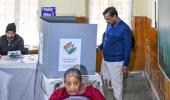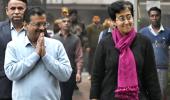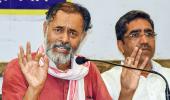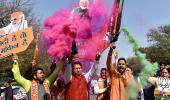Delhi faces a severe financial crunch and the deficit is largely due to numerous welfare schemes without adequate revenue flowing in.
The success of welfare schemes and electoral promises will need careful financial planning and out of the box thinking to whip up additional revenue, notes Ramesh Menon.

In one of the most keenly contested assembly elections, the Bharatiya Janata Party trumped the Aam Aadmi Party in Delhi winning a comfortabe majority in the 70-member House.
It was a prestigious battle for the BJP that has not seen power in Delhi for 27 years.
Right from Prime Minister Narendra D Modi, Home Minister Amit A Shah, other Cabinet ministers, MPs, and chief ministers like Yogi Adityanath of Uttar Pradesh, along with other BJP chief ministers, campaigned aggressively showing that it was a high stakes battle.
It was an apparent battle for survival as AAP supremo Arvind Kejriwal faced an overly aggressive BJP pulling out all the stops.
The giant killer -- as he was known having defeated Sheila Dikshit in 2015, who had completed three terms as chief minister -- Kejriwal lost this time to Parvesh Verma of the BJP. Former deputy chief minister Manish Sisodia also lost the election.
AAP won 22 seats. The BJP won 48, and the Congress drew a blank as it had in the last two elections.
Kejriwal had to battle incumbency and repair his damaged image after the enforcement directorate arrested him in March last year for his alleged involvement in a multi-crore rupee scam.
AAP's top leaders were also jailed as investigating agencies slapped cases of money laundering in the alleged Delhi Liquor Policy.
Though nothing concrete has been proved, the corruption charges stuck in the voter's consciousness.
It punctured the ideological umbrella that AAP held since its inception as one that was created to fight corruption.
A report by the Comptroller and Auditor General said that as due process was not followed by the Kejriwal government in implementing the policy, there was a revenue loss of Rs 2,026 crores (Rs 20.26 billion). It spoke of glaring lapses, violations and wrong decisions that benefitted certain parties as the due process was not followed.
Kejriwal was jailed, but continued as the chief minister. When the court released him on bail, saying he should not do any administrative work, he hesitatingly appointed Oxford educated Atishi as a 'temporary' chief minister.
Clearly, he was eyeing the seat and bidding his time.

Verma, whose late father Sahib Singh Verma was Delhi's second chief minister, defeated both Arvind Kejriwal and Sandeep Dikshit of the Congress. Photograph: ANI Photo
As AAP was conspicuously mute during the CAA movement and the Delhi communal riots that followed, it alienated Muslims who had earlier supported the party.
Numerous Dalit voters also moved away as AAP failed to resolve issues related to irregular salaries and appointments for municipal and sanitation workers.
There were other reasons like Delhi's crumbling infrastructure, excessive pollution, poor sanitation, improper garbage disposal, traffic woes, and flaws in the welfare delivery system.
AAP helplessly watched as the BJP poached its Jat leader Kailash Gahlot and Dalit leaders like Raaj Kumar Anand and Sandeep Valmiki.
AAP MLA Mukesh Ahlawat, who was also a minister, claimed he was offered Rs 15 crores (Rs 150 million) by the BJP on the eve of election results to switch over.
One major issue that riled voters was the constant tussle between the centrally appointed lieutenant governor and the Delhi government which affected day to day governance.
Voters wondered if it would be better to back a party that was in power at the Centre to avoid this friction.
Kejriwal repeatedly said that in the last ten years that he was not allowed to freely work and implement decisions.
The Modi government made governance very difficult for AAP when it thwarted a Supreme Court judgment that restored control of the bureaucracy to the Delhi chief minister.
To negate the judgment, and continue to control the functioning of the Delhi government, the Modi government issued an ordinance in May 2023, giving new powers to the lieutenant governor. Kejriwal was left powerless, making it difficult to implement what he wanted in Delhi.
In 2015, AAP won 67 of the 70 seats at a time when the BJP had swept the national election in what was known as the 'Modi wave'. The Modi magic did not work in Delhi; the BJP just won three seats.
Nor did it in 2020 when AAP won 62 seats, losing only eight seats to the BJP.
In the last ten years, the AAP government gingerly managed its revenue while increasing its expenditure on various subsidies for people with low incomes, such as healthcare, education, and transport.
Three significant subsidies that the Kejriwal government spent money on were Rs 440 crores (Rs 4.4 billion) on free bus travel for women, Rs 3,600 crores (Rs 36 billion) on 100% electricity waiver up to 200 units and 50% from 201 units to 400 units and Rs 500 crores (Rs 5 billion) on a water subsidy that provides up to 20,000 litres free every day.

In 2012, Dr Manmohan Singh's government was paralysed as it was struck with wild allegations of corruption. It was under a dark cloud when activist Kisan Baburao Hazare started the India Against Corruption movement in Delhi. It caught the public's imagination all over India as corruption was a rampant sore eating into the vitals of society.
Arvind Kejriwal joined Hazare. He rode on the campaign and was one of its most vocal faces.
Mammoth crowds thronged India Against Corruption meetings as the BJP got its cadres along with the RSS to push it and hype it beyond imagination as it effectively black brushed the Congress.
Predictably, the 2014 national elections saw the Congress routed, helping the BJP make national inroads.
Kejriwal eventually broke away from Hazare, insisting he had to get into politics to eliminate corruption and formed AAP.
When he floated a political party, the nation watched with hope as he held out the promise of a clean, non-corrupt government that had only the welfare of the people in mind.
Idealists joined him, wanting to be a part of the change Indian politics badly needed.
Many non-political activists joined the AAP bandwagon: Kiran Bedi, Yogendra Yadav, Shanti Bhushan, Prashant Bhushan, Ashutosh, Medha Patkar, Anjali Damania, Kumar Vishwas, Mayank Gandhi, Ashish Khetan and many others.
None of them are with Kejriwal now, as they did not like his dictatorial style of functioning.
Kejriwal was not a team player and wanted the party to revolve around himself as a cult figure. The concentration of power was around him and not the party's organisational structure.
He was educated, said the right things and the optics were perfect. He rode into power but resigned after 49 days into his first term, saying the alliance with Congress was not working and he could not bring in radical anti-corruption legislation.
It was a masterstroke as the voters saw that he was not hungry for power and was serious about what he wanted to do in politics.
Contesting alone in 2015, AAP swept the election, decimating the BJP, winning 67 out of 70 seats.
The BJP won just three seats despite the Modi wave in 2014 that gave the party a resounding majority in the Lok Sabha.
That AAP victory whipped up the dream of a new brand of politics that promised to cleanse the nation of corruption and bring in a new model of governance that would have people calling the shots.
He started well-showing transparency by putting up the names of all donors. This backfired when many of them got income tax notices soon after, and the list had to be removed.
Five years later, in 2020, AAP swept the assembly elections once again, winning 62 seats; the BJP won the remaining eight.
Surveys indicated that in the last two elections, AAP attracted a considerable percentage of votes from the lower middle and poorer classes.
Over the years, AAP built a solid constituency of voters who are beneficiaries of its various freebies, like free power, water, education in government schools, the establishment of better hospitals and mohalla clinics, free bus travel for women, free pilgrimage trips for senior citizens and cash doles to women and priests.

For the 2025 campaign, Kejriwal told youngsters he planned to give them a 50 per cent discount on metro tickets. He also promised free medical services to all those above 60.
These ploys put the BJP on the backfoot, and Modi, who spoke against revdi culture -- granting freebies -- assured that the BJP would not withdraw the freebies if it was voted to power.
In fact, the BJP offered more than AAP. For example, it offered women a larger direct cash transfer. As AAP promised women Rs 2,100 a month, the BJP pledged Rs 2,500.
Women constitute 46 per cent of Delhi's electorate.
While AAP promised a subsidy of Rs 500 per cooking gas cylinder, the BJP said it would do the same, and in addition, it would give free cylinders on Holi and Diwali.
Retired judge S N Dhingra filed a public interest litigation in the Delhi high court, saying that AAP had promised Rs. 2,100 as direct bank transfers each month to female voters and other parties had also promised similar sops, which constituted corrupt practices under Section 123(1) of the Representation of the People Act, 1951, as it attempted to unduly influence voters and amounted to bribing them.
Judge Dhingra wanted the Election Commission to restrain AAP and other political parties trying to do the same. The court refused an urgent hearing and asked it to be listed by the register.
Such sops are bad for the economy, but political parties nationwide are going to resort to it as it is the easiest route to grab power. They couch it as 'welfarism', but it is actually bribing the voter.
If the proposed welfare schemes are implemented, the Delhi government will have to cough up around Rs 18,000 crores (Rs 180 billion) nannually, which is a whopping 23 per cent of Delhi's budget.
Most of the promises AAP made in 2020 were fulfilled, like free electricity up to 200 units, free 20 kilolitres of water, free bus rides for women, ensuring education and health services, doorstep delivery of rations, and regularisation of some unauthorised colonies.
Post-poll surveys in 2020 showed that 61% of the poorest voted for AAP. This time, RSS workers were reported moving from door to door in over 200 clusters where the poor lived.
Delhi has around 1.5 million slum voters who form around 10 per cent of the electorate.
The middle class constitutes 45 per cent of the electorate in Delhi. Modi and Amit Shah extolled the latest Budget at their rallies, which gave tax exemptions to the middle class like never before.
Dalits comprise 16.7 per cent of Delhi's population. No political party can afford to ignore them. Traditionally, they voted for the Congress, but gravitated towards AAP as they became beneficiaries of the party's welfare schemes. AAP swept all the 12 reserved constituencies in 2015 and 2020.
This election was critical for the Congress after its losses in Haryana and Maharashtra. It was desperate to make some dent as it would otherwise put a question mark on its relevance in the INDIA Opposition conglomerate.
As it is, the Congress suffered from an existential crisis with the INDIA coalition comprising the Trinamool Congress, Dravida Munnetra Kazhagam, and the Rashtriya Janata Dal supporting AAP in this election.
The Congress is fighting for survival in Delhi as it drew a blank in 2015, 2020 and 2025 where its vote percentage plummeted to an all-time low.
This rout is mainly because it has no leadership in Delhi. The Congress party ranks have been completely demoralised as they cannot match the BJP and AAP electoral machines.
It seems strange now that the Congress ruled Delhi for 15 years under Sheila Dikshit's leadership.
Her son, Sandeep Dikshit, contesting against Kejriwal in the New Delhi constituency, does not have his mother's charisma and acumen and won 4,568 votes.
This election also highlighted how the INDIA grouping had collapsed as the Congress and AAP fought each other. Had they fought the election together, the AAP would have won 13 more seats.

As the capital of India, Delhi is one of the most polluted cities in the world with a pathetic air quality index.
A huge floating population in Delhi needs to be helped and regulated as they are mostly from disadvantaged communities.
Delhi faces a severe financial crunch and the deficit is largely due to numerous welfare schemes without adequate revenue flowing in. The success of welfare schemes and electoral promises will need careful financial planning and out of the box thinking to whip up additional revenue.
Political clashes will intensify in coming years as both the BJP and AAP would not want to secede its advantages to each other and adroit political strategies will have to be crafted.
It is not going to be an easy term for the BJP.
Ramesh Menon, award-winning journalist, educator, documentary filmmaker and corporate trainer, is the author of Modi Demystified: The Making Of A Prime Minister.
Photographs curated by Anant Salvi/Rediff.com











 © 2025
© 2025